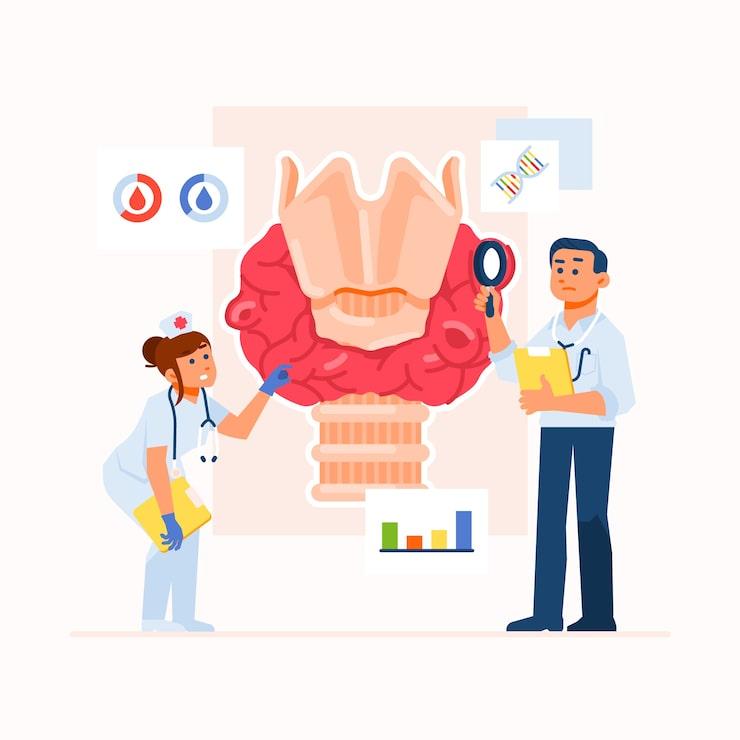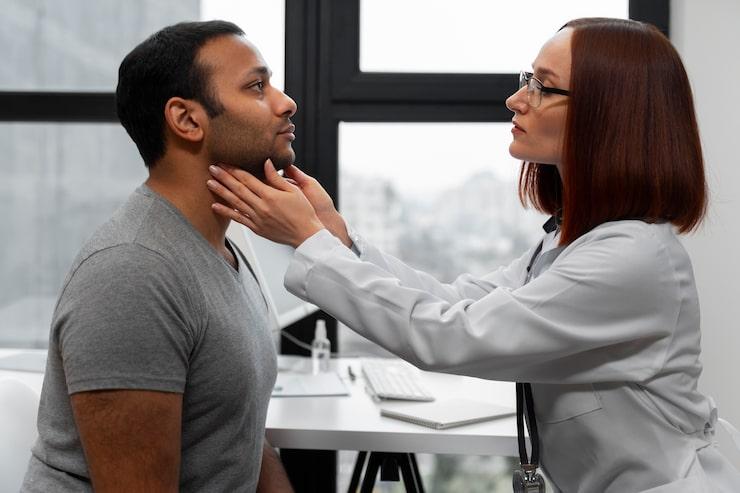
Man showing symptoms of esophageal cancer
The esophagus is a muscular tube that goes from the throat to the stomach. It is particularly crucial for getting food and fluids into the digestive system. Most people don't think about this part of their body very often, although esophageal cancer can sometimes affect it. Esophageal cancer isn't as frequent as other types of cancer, but it is comparatively quite aggressive and usually detected in its later stages. So, it's really crucial to know about it, catch it early, and receive treatment as soon as possible.
Esophageal cancer happens when malignant cells proliferate in the tissues of the esophagus. Over time, these cancerous cells can migrate to deeper layers of the esophagus and then to nearby organs or even distant parts of the body (metastasis).
There are two basic forms of esophageal cancer:

Illustration explaining esophageal cancer
Esophageal cancer doesn't happen all at once; it usually takes years of being around things that put you at risk for it. Knowing them can help you stay away from them and find them quickly.
1. Smoking
Smoking cigarettes, cigars, or pipes greatly increases your risk of getting squamous cell carcinoma. Tobacco chewing also makes cancer grow in the esophagus.
2. Having an alcoholic drink
Long-term and heavy drinking, especially when combined with smoking, significantly elevates the risk.
3. Gastroesophageal Reflux Disease (GERD)
Long-term acid reflux can irritate the lining of the esophagus, which can lead to Barrett's esophagus. This condition makes adenocarcinoma more likely.
4. Being too heavy
Being overweight can lead to Barrett's esophagus and acid reflux, which can indirectly boost the risk of cancer.
5. The food you eat
A lot of processed or smoked foods and not enough fruits and vegetables may be to blame.
6. Age and Gender
Esophageal cancer is more common in people over 55. The condition is three to four times more likely to affect men than women.
7. Family History and Genes
Having a family history of esophageal cancer or genetic abnormalities like tylosis can raise the risk.
8. Other Conditions
Achalasia is a disorder that makes it hard for the esophagus to move food into the stomach.
Esophageal Injury: Damage from ingesting things that eat away at the body or getting radiation therapy to the chest.
Esophageal cancer is often missed in its early stages. People who are at risk should get checked out regularly because symptoms usually don't show up until the problem gets worse.
Some common indications are:
These indicators don't usually mean you have cancer, but you should never ignore them, especially if they don't go away.
If doctors think you could have esophageal cancer, they might suggest the following tests:
A flexible catheter sends a camera into the esophagus to look for odd growths.
Biopsies can be done during the process.
After drinking a barium solution, X-rays can assist in finding abnormalities with the esophagus.
Uses sound waves to generate clear photographs of the lymph nodes and the wall of the esophagus.
Finds out how far the cancer has gone.
The diagnosis is confirmed by looking at tissue samples under a microscope.
Receiving a diagnosis early is crucial for achieving better treatment outcomes.

Doctor checking patient with esophageal cancer
The type and stage of cancer, the patient's health, and their preferences all have a part in how they are treated. A group of specialists, like gastroenterologists, oncologists, surgeons, and dietitians, often works together to oversee care.
1. Surgery: It may be necessary to surgically remove the tumor and parts of the esophagus that are affected.
Esophagectomy is the most common type of surgery. It involves removing part of the esophagus and replacing it with tissue from the stomach or intestines.
Surgery might be performed in conjunction with chemotherapy or radiation to enhance outcomes.
2. Radiation therapy
It targets cancer cells with high-energy beams.
External beam radiation: It comes from outside the body.
Brachytherapy: Putting radioactive material in the esophagus.
Sometimes used before surgery (neoadjuvant therapy) to shrink tumors or after surgery (adjuvant therapy) to kill any remaining cancer cells.
3. Chemotherapy
To eliminate cancer cells, people take drugs by mouth or through an IV.
You can use it with radiation (chemoradiation).
Used to shrink tumors before surgery or keep them from coming back after surgery.
4. Therapy that focuses on certain cells
These drugs work on specific genetic or molecular changes in cancer cells.
Trastuzumab is one medicine that can help those with HER2-positive esophageal cancer.
More accurate than chemotherapy and often with fewer side effects.
5. Immunotherapy
Helps the immune system locate and destroy cancer cells.
In more serious cases, medications like pembrolizumab may be used.
6. Endoscope-based treatments
For cancers that are very early on:
Endoscopic mucosal resection (EMR): This surgery takes out cancers that aren't very deep.
Ablation therapies employ light or heat to eliminate cells that aren't normal.
7. Take care of the sick
For advanced esophageal cancer, treatment may focus more on easing symptoms than on finding a cure. Stents to keep the esophagus open could be one of these things.
You can't avoid every case, but there are several things you can take to minimize your risk a lot:
Esophageal cancer is hard to deal with because it is typically found late, as the early indicators are not particularly evident. However, knowing the risk factors, recognizing the warning signs, and seeking medical care promptly can significantly impact the outcome. Thanks to advances in surgery, targeted therapy, and immunotherapy, patients now have more treatment options than ever before. For top notch services, make sure to contact Prakash Hospital, Noida.
You can still protect yourself best by not smoking, drinking alcohol in moderation, keeping a healthy weight, and controlling acid reflux. These things can really lower your risk.
Suppose you have problems swallowing all the time, chest pain, or weight loss that you can't explain, visit a doctor straight away. Finding problems early can save lives, and taking care of yourself can maintain your digestive system and health in good shape.
We offer expert care across key specialties, including Medicine, Cardiology, Orthopaedics, ENT, Gynaecology, and more—delivering trusted treatment under one roof.
Prakash Hospital Pvt. Ltd. is a 100 bedded NABH NABL accredited multispecialty hospital along with a center of trauma and orthopedics. We are in the service of society since 2001.
OUR SPECIALITIES
Contact Us
D – 12A, 12B, Sector-33, G. B. Nagar, Noida, Uttar Pradesh 201301
+91-8826000033

© 2026 All rights reserved.
Designed and Developed by Zarle Infotech